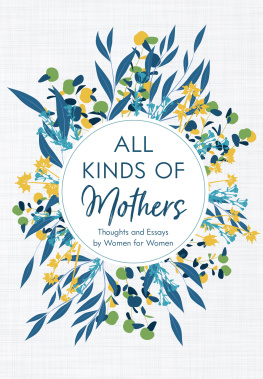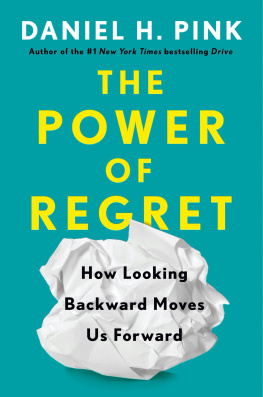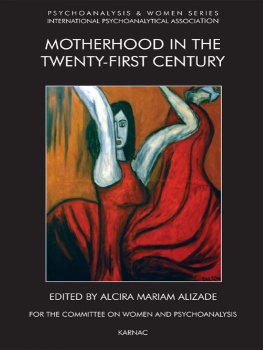CONTENTS
Guide
Pages
Regretting Motherhood
A Study
Orna Donath
Copyright 2017 by Orna Donath. All rights reserved. No portion of this book, except for brief review, may be reproduced, stored in a retrieval system, or transmitted in any form or by any meanselectronic, mechanical, photocopying, recording, or otherwisewithout the written permission of the publisher. For information contact North Atlantic Books.
2016 by Albrecht Knaus Verlag, a division of Verlagsgruppe Random House GmbH, Mnchen, Germany.
First published in collaboration with Margret Trebbe-Plath as Regretting Motherhood: Wenn Mtter bereuen by Albrecht Knaus Verlag, 2016. English translation by Academic Language Experts (http://aclang.com)
Published by
North Atlantic Books
Berkeley, California
Cover and book design by Jasmine Hromjak
Composition by Happenstance Type-O-Rama
Printed in the United States of America
Regretting Motherhood: A Study is sponsored and published by the Society for the Study of Native Arts and Sciences (dba North Atlantic Books), an educational nonprofit based in Berkeley, California, that collaborates with partners to develop cross-cultural perspectives, nurture holistic views of art, science, the humanities, and healing, and seed personal and global transformation by publishing work on the relationship of body, spirit, and nature.
North Atlantic Books publications are available through most bookstores. For further information, visit our website at www.northatlanticbooks.com or call 800-733-3000.
Library of Congress Cataloging-in-Publication Data
Names: Donath, Orna, author.
Title: Regretting motherhood / Orna Donath.
Other titles: Regretting motherhood. English
Description: Berkeley, California : North Atlantic Books, [2017] | First
published as Regretting Motherhood: Wenn Mtter bereuen by Albrecht Knaus
Verlag, 2016.
Identifiers: LCCN 2016053522 | ISBN 9781623171377 (trade paper) | ISBN 9781623171384 (ebook)
Subjects: LCSH: Motherhood. | Regret.
Classification: LCC HQ759 .D63813 2017 | DDC 306.874/3dc23
LC record available at https://lccn.loc.gov/2016053522
North Atlantic Books is committed to the protection of our environment. We partner with FSC-certified printers using soy-based inks and print on recycled paper whenever possible.
Instead of asking, how can this be true? we could ask, what if this were true?
What then?
Arthur Bochner
Acknowledgments
This book would have not come to be realized without the women, the men and the institutions that supported it, and me.
First and foremost I would like to thank the women who participated in my study: Bali, Brenda, Carmel, Charlotte, Debra, Doreen, Edith, Erika, Grace, Jackie, Helen, Jasmine, Liz, Maya, Naomi, Nina, Odelya, Rose, Sky, Sophia, Sunny, Susie and Tirtza. Your trust within our social climate cannot and should not be taken for granted. This book is dedicated to each and every one of you.
Erin Wiegand, who was convinced that this book would be of value to women in America, deserves my deepest appreciation. Thank you for insisting on its importance, and thank you for devotedly working with me day and night on finding accurate ways to articulate my intentions in English. Your questions and suggestions illuminated my own thoughts even further.
Without Margret Trebbe-Plath, the editor of the German edition of this book, nothing would have been the same. Thank you for creating a bridge between languages, countries, and human hearts. I feel blessed, as I could not have asked for a more sensitive and wise creative teamwork on words that mean the world to me.
Britta Egetemeier and all the professional women from Knaus Verlagthank you for walking this path with me. I cherish your devotion to un-silencing the unspoken between us women and mothers.
Esther Gbel, who thought and felt that my study should be discussed in Germanythank you for noticing my work and for giving such respectful attention to matters that concern so many women around the world.
I am thankful to Prof. Hanna Herzog and Prof. Haim Hazan, who supervised my study as a Doctoral Student in the Department of Sociology and Anthropology at Tel-Aviv University (Israel). They believed in my ability to explore on my own while holding the safety net I needed beneath my feet.
As the study was supported by the Presidents Fellowship for Excellence at Tel-Aviv University (Israel) and by Jonathan Shapiras scholarship for excellency in PhD studies in the Department of Sociology and Anthropology at Tel-Aviv University (Israel), I would like to thank their generosity and faith in me. My gratitude is given as well to researchers from Gender Studies in Ben-Gurion University (Israel) who shed a light on the road I decided to take.
My family and my chosen family deserve all my appreciation for being patient with me on a daily basis during the years, on weekends and holidays. Without knowing that you were there waiting, with love and concern, for me to come back from the depths of writing, it would have been so much more difficult to dive in fully and disappear.
And to you, my beloved one. The deepest thankful feelings for your existence that holds me.
While I was working on the English edition of this book, my grandmotherNoga Donathpassed away. She and I had many conversations about her deep desiresince she was a young girlto be a mother, and about how her thankfulness for being a mother persisted and deepened over time. Despite the fact that our emotional stances were different, it never stopped me from listening to what she said, from understanding her pride in mothering, or from being an ally to her joy in having her dream of motherhood came true. In turn, her emotional stances never prevented her from being interested in my attitudes, from asking questions in order to understand them better, from being an ally to my joys, or from giving me her blessings to my own way even if she didnt comprehend it to its full extent.
This book is dedicated to the spirit of the inter-generational, inter-human, and inter-emotional dialogue that she and I had.
Introduction
You will regret it!
You!
Will!
Regret not having children!
These words were ingrained in me in 2007 while conducting research on Israeli-Jewish women and men who felt no desire to be parents. The prophecy of doom in these words, which are hurled again and again at almost anyone who does not want to be a parent in general and a mother in particular, continued to echo in my head: They will surely regret it. Women regret not becoming mothers. Period.
This definitive ruling kept troubling me because of the dichotomy it suggested. On the one hand, it uses regret as a weapon to threaten women who do not want to be mothers; on the other, it simply excludes any possibility that women might also regret becoming mothers, that they might wish to return to being nobodys mom.
A year later, I began my study of mothers who regret in Israel, a country within which, on average, a woman will give birth to three children; In some of these countries, women often seem to have more room to maneuver in their tendencies toward motherhood, but they are nevertheless under social pressure to make the right decision and become mothers.
No matter which country we look at, women are giving birth and raising children while so many of them are facing tremendous hardships in relation to motherhoodand at the same time, regret is rarely spoken of.










